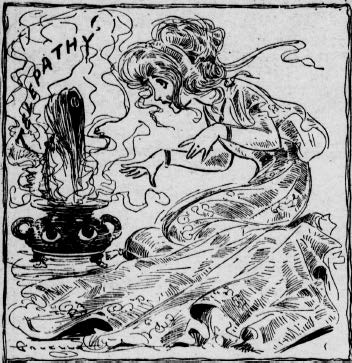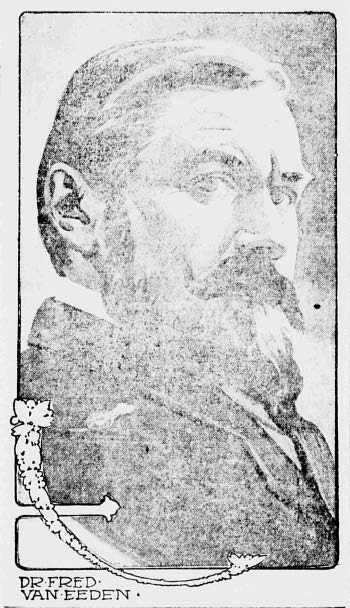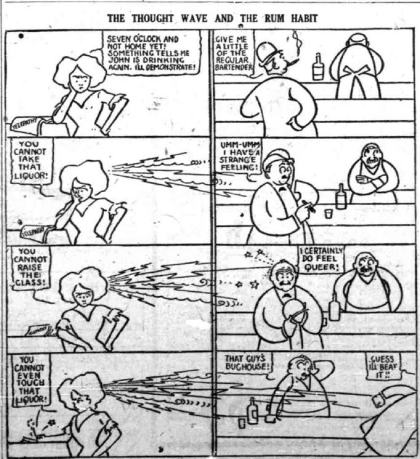History has blessed us with combinations that just seem to work, the Spork for instance, or William Shatner and Ben Folds Five performing “In Love”. Some of these combinations border on the bizarre, like dipping French fries in chocolate milk shakes at Wendy’s. One of the strangest combinations of all took place in Illinois during April of 1908, when temperance met telepathy.
Americans, then as of now, liked to have a drink. In 1907, the consumption of wines and liquors per capita was 23.53 gallons; it was up from 20.38 gallons in 1905 and 7.7 gallons in 1870. The Anti-Saloon League viewed these statistics with alarm, and deployed a formidable army advocating for Prohibition. With $500,000 in yearly funds available, the League deployed a thousand paid speakers to rail against demon rum and released 35 different publications with a combined circulation of 250,000. They’d had some recent success, with Alabama, Georgia, North Carolina, and Oklahoma all having just banned liquor sales statewide. Despite pressure on Congress, national success eluded the League. Instead, they focused on what was called the “local option,” a county by county crusade to outlaw saloons.
Anti-prohibitionists fought back with some rhetoric of their own. Charles W. Darr, speaking on behalf of the Personal Liberty League to a group of pro-liquor ministers, told a gathering in Washington D.C. that his organization stood as a bar to “frenzied fanaticism”. Darr claimed “[t]his is not a question of prohibition prohibiting, but an economic one. Prohibition is led by the short-haired women and the long-haired men, 99 per cent of whom do not pay taxes, and will not if they live hundreds of years.” Temperance should begin not at the ballot box, but at home, “where the mother should be, instead of attending congressional meetings, attending women’s club engagements, and up to the House meetings where the short-haired women try to deprive us of our rights.”
If appeals to disregard short haired women didn’t work, there were other reasons to allow a man a drink, as The Spokane Press pointed out: “The Russians who are anarchists are the men who remain sober and brood over the oppression of the masses. The sodden vodka drinkers make no trouble…The Italians who furnish most of our anarchists are one of the most temperate peoples in Europe. Scandinavia, where the increase in drunkenness is looked upon by statesmen as a great national danger, is a land without anarchists.”
At the same time the Prohibitionists were trying to reform men’s palates, others were at work exploring men’s minds. The newspapers of the day were filled with telepathic advice and encounters. A gentleman known only as P.S. wrote to his local paper, “[m]y wife and I were discussing the annoyance caused by cats gathering in our yard of nights. Both of us were at a loss to remedy it. Five minutes later, while upstairs, the thought occurred to me that sprinkling black pepper on the lawn would make the cats seeks some other spot. I said nothing, and as I came downstairs met my wife, who at once said: ‘I have a scheme – what’s the matter with sprinkling black pepper in the yard.’ Neither of us had heard of the black pepper plan before. Why did we both think of it at the same time.” Astounding!
Another writer, who went by the name Inquirer, related “I believe telepathy gave me my wife. I was in Chicago in 1903 on business. While discussing affairs with the purchasing agent of a railroad I happened to look at a young lady who sat at a typewriter. I had never seen her before. She was a pretty woman, but, as she will admit, not dazzling.” Then it happened, and Inquirer was struck, “A strange current seemed to course through my brain. Actually, I lost my words. And as plainly as could be I heard a voice saying: ‘She will be your wife’”.
He continued, “I quickly recovered myself and pursued my interview. Three hours later, on crowded State street, I came face to face with the same young woman. I had not spoken a word to her in the office, and had never expected to see her again. Instantly the strange voice whispered again: ‘She will be your wife.’ I was so impressed that I boldly addressed her. In six weeks we were married, and on our wedding day my wife revealed to me a secret that she had promised to tell me on that date. She said: ‘When I first saw you I felt that a voice was saying to me, ‘That’s your future husband’”. Imagine her amazement then when I returned the compliment by relating the story of my own experience.” Love at first think, methinks.
Dr. Van Eeden, a Dutch sociologist, advised American readers that “Every home should be conducted along the lines of mental suggestion, for it is only then that harmony can exist throughout the household…When the child is drowsy just before retiring is the best time for the mother or father to transmit thought. Its mind is receptive and it responds more easily to ideas. The childish mind is impressionable, and a mother or father by verbal and mental suggestions forms either a worthy or wicked character for the child.”
The telepathic process itself was simple according to Edward B. Warman, who billed himself as an “Eminent Psychologist and Hygienist”. “If you desire to aid one – mentally, morally, or physically – at home or at a distance, you may readily do so after you retire…just before dropping asleep hold the thought of helpfulness on and for the one whom you wish to benefit. What takes place? Your messages are received by the non-sleeping mind of the one to whom they are sent…the recipient, during his waking hours, will be impressed to follow an impulse coming from he knows not where; an impulse that will be wholly the result of your desire; an impulse to spur himself on to higher aims, greater ambition and the exchange of hope and courage to displace fear and discouragement; an impulse to lay hold of every hygienic measure for the restoration of health; in other words, whatever you desire for him, he will desire for himself, if you hold the though sufficiently strong for him to get it subjectively.”
Mrs. Marvin Miller, of Jacksonville, Illinois, was a passionate Anti-Saloon League member, and a believer in telepathy. To Mrs. Miller’s credit belongs the idea of wedding temperance to telepathy. Mrs. Miller spoke of the idea to her friends, and urged it at several talks to Illinois daughters and mothers. She and her friends even gave a demonstration. According to the Ocala Evening Star of April 3, “[a]t Aurora last week the Rev. William Wasson, rector of the Episcopal church, was scheduled for an address in opposition to the local option. The women…sat in the audience and launched thought waves at him. They say he was so confused that this thoughts became muddled and his language halting.”
With a county by county election on the Prohibition question scheduled for April 7, 1908, the Temperance Thinkers mobilized some 500,000 women to dress all in white and to direct thought waves at voters. “Women arrayed in white will assemble at the polls,” described one paper, “and by concentrated mental effort endeavor to influence the men. The male-citizen will also be subjected to visual influence of an extraordinary character. In order to get to the voting booths he will be compelled to walk between lines of women and girls.” With only a small handful of urban counties dissenting, Illinois barred some 1,500 saloons. Twenty counties voted for an absolute ban on liquor.
The Arizona Republican, reporting on the results, sounded a note of alarm. “We can think of no more powerful influence than the concentrated effort of a half million feminine wills directed towards a certain object. There was nothing unlawful or improper in the exercise of such an influence, provided the thought currents are turned off when the polls closed and were not permitted to play after the counting of the ballots began. In that case, the mental suggestion of the ladies to the election boards would have amounted to hypnotism, which, though not expressly inhibited by the statutes would have been reprehensible.”
As an electoral tool and fad, telepathy seems to have faded after 1908. Prohibition did not. It won the passage of the nationwide ban on alcohol, which was repealed in 1932. Even today, many counties remain “dry”, but perhaps with concerted mental effort, we can make a change. Who thinks so?
While we strongly support telepathy when it comes to temperance, we doubt its efficacy when it comes to blogging. If you like our stuff, tell the twitterverse, tell a friend, and subscribe yourself! Links are up at the top right.



exhaust performance
/ February 26, 2013If all posts were as detailed as this one, the web would be an even better place to perform research. Fantastic work, and thank you for spending some time to express your ideas with everyone on this issue.